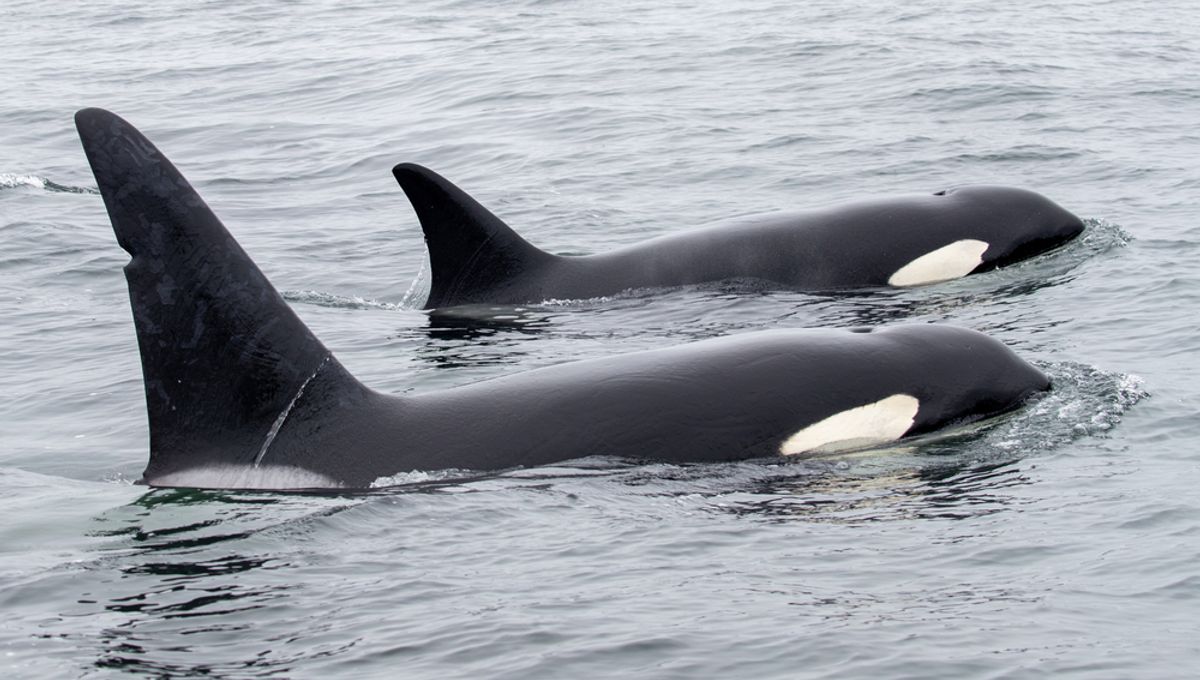
Females of a population of orcas (killer whales) have been found to invest an astonishing amount of effort in their male offspring, to an extent never previously reported in nature. Their daughters get much less support. The sacrifices are so large the mothers are much less likely to successfully raise younger children, of either sex, once they have a son.
It is not yet known whether the finding applies to all orcas, but it is so far from anything seen in other species that follow-up research seems assured.
Although orcas are all still listed as one species, their behaviors are so varied many biologists argue they should be split up. Some orcas feed on fish, for example, while others live on mammals or birds. Some roam widely, while others stick to a relatively limited territory.
Biologists from three UK universities examined almost 40 years of data from the “southern resident” killer whale population, who live off the US west coast and Vancouver Island and feed mainly on salmon. In Current Biology, they report the scale of the sacrifice these orca mothers make for their sons.
Even among social mammals, killer whales are unusual because offspring of both sexes stay in the group in which they were born, although frequently mating with neighbors. Most other species avoid inbreeding by having one sex leave their birth pack on reaching maturity.
The paper’s authors had noticed orca mothers cared for their daughters until they were of breeding age, but continued to support their sons for their whole lives. “Our previous research has shown that sons have a higher chance of survival if their mother is around,” said Dr Michael Weiss of the University of Exeter in a statement. “In this study, we wanted to find out if this help comes at a price.”
The answer is definitely yes. The more sons the whales had, the lower their chances of raising another calf to the age of one. Yet the same was not true of daughters, proving it has nothing to do with age. Nor was the effect subtle: a son reduced future successful reproduction prospects each year by 70 percent. The death of an adult son appears to partially restore mothers’ breeding capacity, although the sample size was insufficient for confidence.
Moreover, the cost of having sons didn’t decrease as they grew older – the cetacean equivalent of having sons refusing to leave home and making younger siblings unaffordable or undesirable.
Orcas are one of the few non-human species that experience menopause, with older females helping their pack survive long after they have stopped having children of their own.
Unusual as this reproductive strategy is, the authors presume it has worked for orca females in the past – evolutionary success is best measured not by number of children but by grandchildren.
However, the southern resident orcas’ survival is threatened by the crash in salmon stocks, and the authors fear they may collectively suffer for the favoritism in an environment where food is scarce. If mothers become unable to reproduce, and daughters don’t thrive because their potential food supply is going to their brothers or male cousins, the outcome could be grim.
The southern resident orcas’ restricted territory makes them much easier to study than wider-ranging populations; scientists have been closely tracking their family tree since 1976. It could be a long time before we know if all orcas behave this way.
The mothers support their sons not only by using their knowledge to guide offspring to prey, but by giving their sons half when they catch a salmon, even when the son would appear perfectly capable of catching his own fish.
Over-extrapolation from animal behavior to humans – sometimes from a single species – is a curse of online debates, and sometimes creeps into peer-reviewed science. Thus people who favor patriarchal social structures like to point to chimpanzees and ignore bonobos. As unwise as it would be to read too much into a single population of a distantly related animal, it’s possible that some human parents will be able to relate.
The paper is open access in Current Biology.
Source Link: Raising Sons Places A Damaging Burden On Killer Whale Mothers